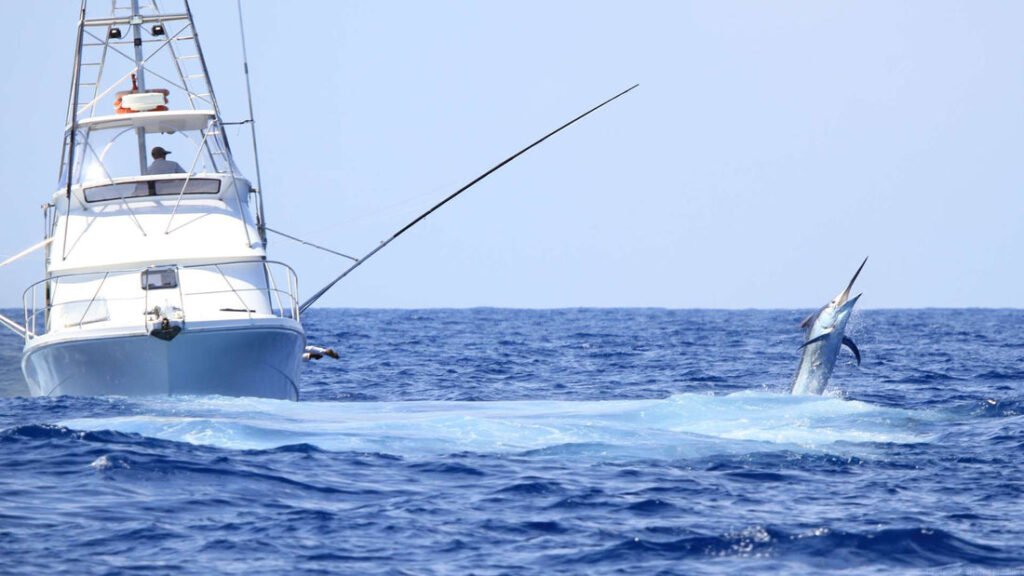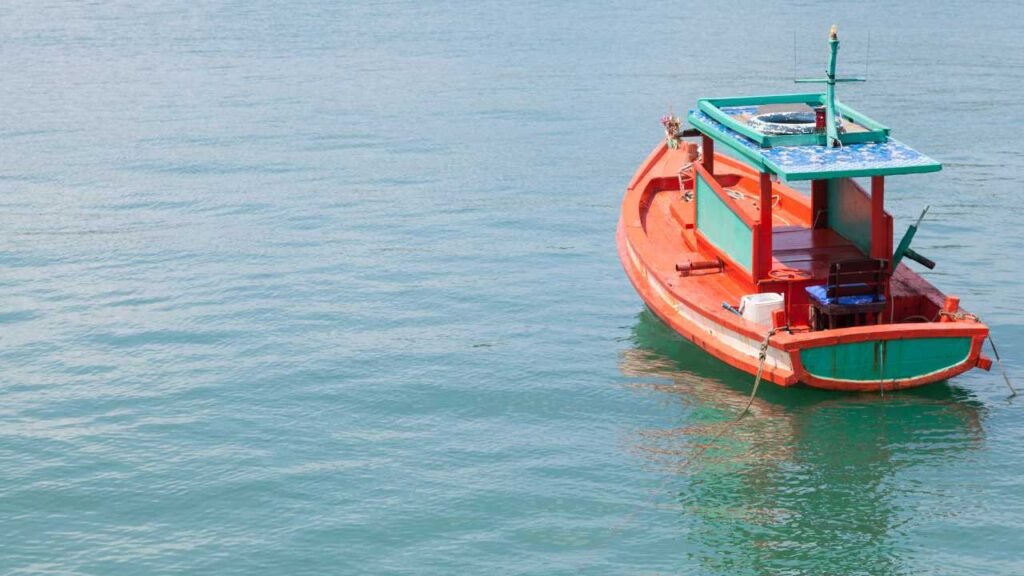Fishing boats have insulators to prevent electrical shock and ensure safety. They protect against corrosion and electrical hazards.
Fishing boats operate in wet and salty environments, making electrical safety crucial. Insulators help prevent electrical currents from causing shocks or fires. They also protect metal parts from corrosion due to saltwater exposure. These insulators are vital for the safety of the crew and the boat’s longevity.
Electrical systems on fishing boats often power lights, navigation equipment, and communication tools. Insulators ensure these systems function without risking the crew’s safety. Investing in quality insulators is a smart move for any fishing vessel operator. This small component plays a significant role in maintaining a safe and efficient fishing operation.

Credit: www.walmart.com
Electrical Safety
Fishing boats often face harsh weather conditions and rough seas. These conditions pose significant risks, including electrical hazards. Ensuring electrical safety is crucial to prevent accidents and fatalities. Insulators play a key role in maintaining safety on fishing boats.
Preventing Electrocution
Fishing boats use electrical equipment extensively. This includes navigation systems, lights, and communication devices. Without proper insulation, these electrical systems can be deadly. Water and electricity are a dangerous combination. Insulators prevent the risk of electrocution by blocking the flow of electricity. This ensures that the crew remains safe.
Insulators also help in protecting sensitive equipment. They prevent short circuits that can cause fires or system failures. This is particularly important during storms or heavy rain. A well-insulated boat is a safe boat.
Insulation Materials
Different materials are used for insulating electrical systems on fishing boats. Each material has its own advantages. The most common materials are:
- Rubber: Highly flexible and water-resistant. Ideal for cables and wires.
- Plastic: Durable and easy to mold. Used in various electrical components.
- Fiberglass: Excellent heat resistance. Often used in insulating panels.
A table of common insulation materials and their properties:
| Material | Properties |
|---|---|
| Rubber | Flexible, water-resistant, non-conductive |
| Plastic | Durable, easy to mold, non-conductive |
| Fiberglass | Heat-resistant, durable, non-conductive |
Choosing the right insulation material is vital. It ensures the safety and longevity of the electrical systems. Regular maintenance and inspection of these materials are equally important.
Environmental Factors
Fishing boats face many challenges from environmental factors. These factors can damage the boat over time. Insulators help protect the boat and its equipment.
Impact Of Saltwater
Saltwater is very harsh on fishing boats. It can cause rust and corrosion. Insulators help to prevent this damage. They create a barrier between the saltwater and the boat’s metal parts. This helps the boat last longer.
Weather Conditions
Fishing boats operate in various weather conditions. Storms, heavy rain, and extreme sunlight can harm the boat. Insulators protect the boat from these weather elements. They help keep the boat’s temperature stable. This makes the boat safer and more reliable.
Durability And Maintenance
Fishing boats face harsh marine conditions daily. Ensuring their durability and maintaining them is crucial. Insulators play a key role in this aspect. They protect the boat and its electrical systems.
Long-term Use
Fishing boats often stay in the water for long periods. Saltwater and weather can damage them. Insulators help protect the boat’s electrical systems from corrosion. This extends the boat’s lifespan.
Insulators are made from durable materials. These materials resist wear and tear. This ensures they last for years without needing frequent replacement.
| Material | Resistance Level |
|---|---|
| Ceramic | High |
| Plastic | Medium |
| Glass | Very High |
Regular Inspections
Regular inspections are essential for maintaining fishing boats. Checking insulators is part of this process. Inspections help find any damage early. This prevents bigger problems later.
Inspections should include:
- Checking for cracks
- Inspecting for wear
- Ensuring tight connections
Maintenance teams can fix or replace damaged insulators. This keeps the boat safe and functional.

Credit: www.amazon.com
Types Of Insulators
Fishing boats use different types of insulators. These insulators keep the boat safe. They prevent electrical problems. Let’s look at some common types of insulators.
Ceramic Insulators
Ceramic insulators are widely used on fishing boats. They are strong and can withstand high temperatures. They also resist water and salt. This makes them ideal for the marine environment.
| Advantages | Disadvantages |
|---|---|
| Durable | Heavy |
| Heat-resistant | Can be brittle |
| Waterproof | Expensive |
Rubber Insulators
Rubber insulators are flexible and easy to install. They are also lightweight. Rubber insulators provide good electrical insulation. They protect wires and cables from damage.
- Lightweight
- Flexible
- Easy to install
Rubber insulators are ideal for small fishing boats. They are less expensive than ceramic insulators. But, they may not last as long.
| Advantages | Disadvantages |
|---|---|
| Lightweight | Less durable |
| Flexible | Can degrade over time |
| Cost-effective | Not suitable for high temperatures |
Installation Process
Installing insulators on fishing boats is crucial for safety and efficiency. Proper installation ensures the boat’s electrical system works flawlessly. This guide will walk you through the installation process step-by-step, highlighting common mistakes to avoid.
Step-by-step Guide
- Gather Materials: Collect all necessary tools and insulators.
- Turn Off Power: Ensure the boat’s power is off to avoid shocks.
- Identify Installation Points: Locate where the insulators need to be placed.
- Clean Surfaces: Clean the installation areas to ensure a strong bond.
- Attach Insulators: Secure the insulators using screws or adhesive.
- Connect Wires: Attach the wires to the insulators carefully.
- Test Connections: Turn on the power and test the connections.
- Inspect Installation: Double-check for any loose connections.
Common Mistakes
- Skipping Cleaning: Dirty surfaces can weaken the bond of the insulators.
- Overtightening Screws: This can crack the insulators.
- Incorrect Wire Attachment: Wrong connections can lead to short circuits.
- Ignoring Power Safety: Always turn off power before starting work.
- Failing to Test: Always test connections to ensure they are secure.
By following this guide, you can install insulators effectively. Avoiding common mistakes ensures your boat’s electrical system remains safe and efficient.

Credit: www.amazon.com
Case Studies
Fishing boats need insulators for many reasons. This section will explore case studies to show their importance. Real-world examples help us understand better.
Real-world Examples
Fishing boats in cold regions need insulators. A study in Alaska showed this. Boats without insulators had many problems. Fish storage areas froze quickly. Workers were uncomfortable and caught colds. Insulated boats kept fish fresh longer. Workers stayed warm and healthy.
Another example comes from Japan. Japanese fishing boats use insulators widely. They save energy and keep equipment running well. Insulated boats reported fewer mechanical failures. This means less money spent on repairs.
Lessons Learned
From Alaska, we learn that insulators are vital. They keep fish fresh and workers warm. Without insulators, costs rise quickly.
The Japanese case teaches us efficiency. Insulators save energy and reduce mechanical issues. This saves money and time. Investing in insulators is wise.
| Region | Benefit |
|---|---|
| Alaska | Keeps fish fresh, workers warm |
| Japan | Saves energy, reduces mechanical issues |
These case studies show the value of insulators. Investing in them brings many benefits. Fishermen around the world should consider them.
Frequently Asked Questions
Why Do Fishing Boats Use Insulators?
Fishing boats use insulators to prevent electrical faults. These insulators protect the boat and equipment from water-induced electrical issues. They ensure the safety of the crew and the vessel.
How Do Insulators Benefit Fishing Boats?
Insulators prevent electrical malfunctions by isolating electrical circuits. They enhance safety by reducing the risk of shocks and short circuits.
What Materials Are Fishing Boat Insulators Made Of?
Fishing boat insulators are typically made of rubber or plastic. These materials are durable and resistant to water and corrosion.
Do Insulators Improve Fishing Boat Efficiency?
Yes, insulators improve efficiency by preventing electrical problems. This ensures uninterrupted operation of critical equipment and enhances overall performance.
Conclusion
Fishing boats use insulators for safety and efficiency. They protect electronic equipment and crew members from electrical hazards. Insulators also help in reducing interference and improving performance. Prioritizing these measures ensures a safer and more productive fishing experience. Understanding their importance can make a significant difference in your boating operations.



